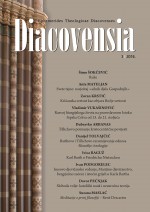TILLICHOVO POIMANJE ‘TEONOMNE KULTURE’
TILLICH’S CONCEPTION OF A ‘THEONOMOUS CULTURE’
Author(s): Dubravko ArbanasSubject(s): Christian Theology and Religion, Philosophy of Religion, Sociology of Culture
Published by: Katolički bogoslovni fakultet u Đakovu
Keywords: religion; culture; essence; existence; autonomy; heteronomy; theonomy; revelation; the sacred; the unconditional;
Summary/Abstract: Paul Tillich spent all his life walking the line between philosophy and theology, or religion and culture, and he paid special attention to the relationship between religion and culture, the relationship which will be the subject of our introductory chapter. Then, in the first part of the paper, we will examine the causes that brought about the schism between these two fundamental determinants of human life; namely, man’s transition from ‘essence’ to ‘existence’ through the symbolism of his ‘fall’ and the conflict within the reason pertaining to ‘autonomy’ and ‘heteronomy’, which also results in an unceasing struggle between an autonomous and heteronomous culture. In the second part, we will discuss Tillich’s ‘theonomous interpretation of culture’ in order to show how the final revelation of the ‘New Being in Jesus as the Christ’ overcomes these conflicts; namely, how theonomy re-establishes the ‘fundamental union’ between autonomy and heteronomy, and we will conclude our investigation by discussing his vision of ‘culture under the influence of the Spirit’ which he calls a ‘theonomous culture’. Through critical analysis we came to the conclusion that Tillich, on the basis of his analysis of the relationship between religion and culture which he summarised with the well-known formula, ‘religion is the substance of culture, culture is the form of religion’, succeeded in connecting the seminal determinants of religion and culture, and showed that the whole culture is founded on a religious substance and as such represents a true ‘union’ of form and meaning that brings out the unconditional meaning, without which all cultural products with their special meanings would become empty and meaningless.
Journal: Diacovensia: teološki prilozi
- Issue Year: 24/2016
- Issue No: 1
- Page Range: 117-136
- Page Count: 20
- Language: Croatian

